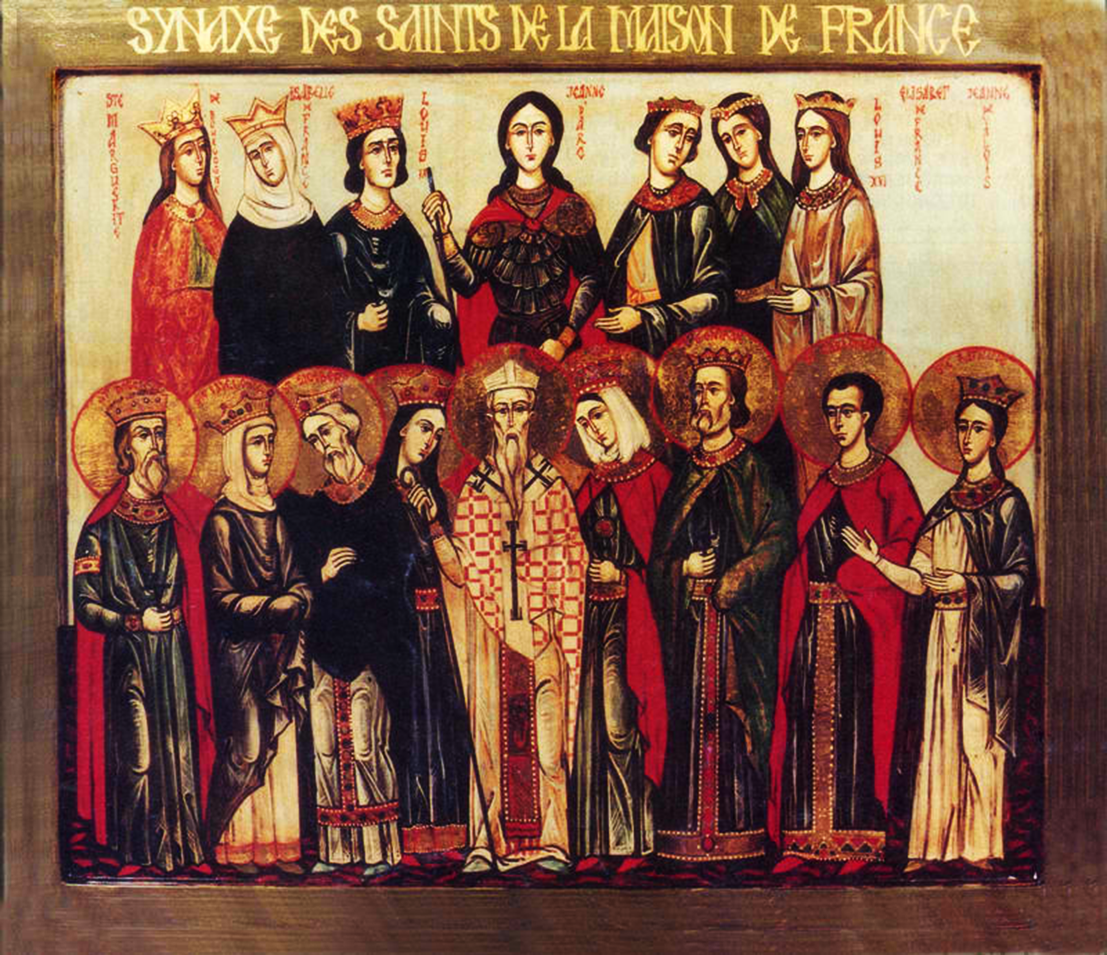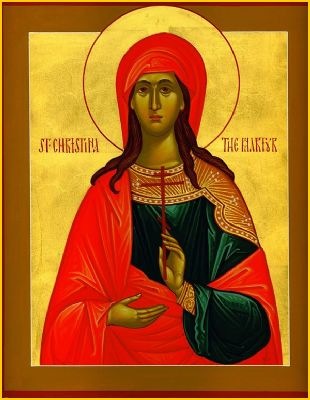Orthodox Saints of the Pre-Schism See of Rome

24th July
ALIPRANDUS (LEUPRANDUS) of PAVIA, an eighth century abbot of the Monastery of St. Augustine in Pavia in Lombardy, northern Italy.
CHRISTIANA of FLANDERS, (Seventh Century), generally thought to have been the daughter of an Anglo-Saxon king, St. Christiana went to Flanders (north-eastern France / western Belgium) where she lived a life of great sanctity. Following her repose, she was immediately venerated as a saint. St. Christiana is the patron saint of Dendermonde (Termonde), in East Flanders in Belgium.
Troparion of St. Christina of Flanders — Tone IV
Your lamb Christina calls out to You, O Jesus, in a loud voice:
I love You, my Bridegroom, and in seeking You I endure suffering.
In baptism I was crucified so that I might reign in You,
and I died so that I might live with You.
Accept me as a pure sacrifice,
for I have offered myself in love.
Through her prayers save our souls, since You are merciful.
Kontakion of St. Christina of Flanders — Tone IV
O Venerable Christina,
You appeared as a shining dove,
With a pair of golden wings
Alighting in the Highest Heavens.
Therefore we celebrate your glorious feast
And bow before the place that holds your relics.
Pray that we may receive grace and healing for body and soul.
CHRISTINA of BOLSENA, (Third or Fourth Century), nothing certain is known of St. Christina’s life, and the only extant written accounts of her date at least five centuries after her martyrdom. However, it is generally accepted that she lived near Bolsena in Tuscany (central Italy), and was the daughter of a wealthy pagan magistrate who had her tortured and eventually martyred for refusing to renounce her Christian faith.
DECLAN of ARDMORE, (Fifth Century), a disciple of St. Colman of Armagh (5th March), St. Declan was later consecrated Bishop of Ardmore in present-day Co. Waterford, Ireland. St. Declan is remembered as one of the saints who evangelised the Irish prior to the arrival of St. Patrick of Ireland (17th March).
DICTINUS of ASTORGA, a follower of Priscillianism, who was brought back to the orthodox faith by St. Ambrose of Milan (7th December). St. Dictinus renounced his errors at the Council of Toledo in 400, and shortly thereafter was consecrated Bishop of Astorga. St. Dictinus reposed in 420.
GODO (GAON) of OYE, a nephew, and disciple, of St. Wandrille of Fontenelle (22nd July), St. Godo received monastic tonsure at Abbey of St. Peter / abbaye Saint-Pierre (later the Abbey of St. Wandrille / abbaye Saint-Wandrille) in Fontenelle, Normandy (northern France), and later founded, and served as Abbot of, an abbey at Oye near Sezanne-en-Brie in north-eastern France. St. Godo reposed circa 690.
LEWINA of SEAFORD, (Fifth Century), according to tradition St. Lewina was a Briton virgin-martyr who was killed by Saxon invaders. She was venerated at Seaford in Sussex, England, and her relics are said to have produced many miracles.
MENEFRIDA, (Fifth Century), St. Menfrida is the patron saint of Tredresick, Cornwall, England; she was a member of the family of the great saint King St. Brychan of Brycheiniog (6th April). No further details of her life are known.
SIGOLENA (SÉGOLÈNE, SIGOLÈNE, SEGOULÈME) of TROCAR, the daughter of an Aquitanian noble who, following the death of her husband, founded, and served as first abbess of, an abbey at Troclar in Albi (in the south of present-day France). St. Sigolena reposed circa 769 and is the patron saint of Albi.
URSICINUS of SENS, the fourth Bishop of Sens (north-central France). He reposed circa 380.
VICTOR, STERCATIUS, and ANTINOGENES of MÉRIDA, while there are no particulars of their life extant, SS. Victor, Stercatius, and Antinogenes are said to have been three brothers, and soldiers, who were martyred circa 304 at Mérida (western central Spain) towards the end of the Diocletianic Persecution.
VINCENT of ROME, (Date Unknown), said to have been a Roman, who was martyred outside the walls of the Rome on the road to Tivoli (central Italy). Unfortunately, there is nothing definite known of his life.
WULFHAD and RUFINUS (RUFFIN) of MERCIA, (Seventh Century), members of the Mercian royal family. SS. Wulfhad and Rufinus were secretly baptised by St. Ceadda (Chad) of Lichfield (2nd March). They were martyred by order of their pagan father.
Prior to the Schism the Patriarchate of Rome was Orthodox, and fully in communion with the Orthodox Church. As Saint John of Shanghai and San Francisco +1966 said “The West was Orthodox for a thousand years, and her venerable Liturgy is far older than any of her heresies”.
Details of British Saints excerpted from Orthodox Saints of the British Isles.
Details of continental saints from these sources.
In many cases there are several spelling versions of the names of saints from the British Isles. I use the Oxford Dictionary of National Biography version as the primary version with the more prevalent version in parenthesis e.g. Ceadda (Chad) of Lichfield.

